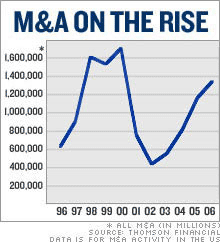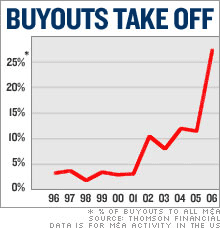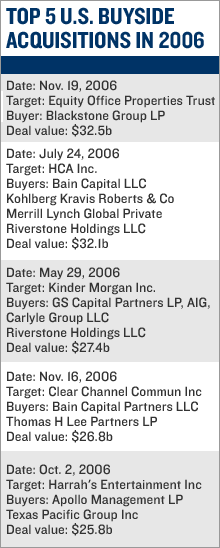After the buyout boom: The bust?A string of deals led by private equity firms will push buyouts to record levels this year. But if things turn sour, look out.NEW YORK (CNNMoney.com) -- The merger machine's rolling full steam ahead, and private equity investors are playing a bigger role than ever before - a trend that's likely to carry into 2007. But some investors and merger experts are starting to worry that the slew of deal-making could come to a nasty end, especially if slower economic growth or a recession make it harder for companies to deal with the debt that's often involved in today's buyout deals.
The merger boom's been fed by low interest rates, rising stock prices, plenty of money in the debt markets and greater tolerance for risk among investors worldwide. In the past 24 hours alone, private equity firms have offered to buy casino giant Harrah's Entertainment (Charts) for $16.7 billion, orthopedic device maker Biomet (Charts) for $10.9 billion and Realogy Corp. (Charts), one of the world's biggest real estate brokers, for $6.6 billion. "It's still going like a house afire," said Colin Blaydon, director of the Center for Private Equity and Entrepreneurship at Dartmouth's Tuck School of Business. The risk, he and others said, is that a downturn in the economy could upset the applecart. "If the debt markets have a crisis of confidence and there is a real turndown of the economy we could see a dramatic pullback," Blaydon remarked. "We know there will be a pullback, we just don't know when that is going to happen." Private equity buyers in particular use borrowed funds to finance their deals, then usually overhaul the business and try to sell to another corporate buyer or investor group - or take it public. Often, investors use the assets of the target firm to secure the debt. Turning companies around has not only been extremely profitable for the investors but also often improves business operations and drives growth. Of the $1.4 trillion in total U.S. merger deals announced so far this year, Blackstone Group, Kohlberg Kravis Roberts & Co. and other buyout firms account for about $370 billion, or 26 percent, of the total. That's not just a record in dollar terms but is more than twice the amount of private equity deals for all of 2005, according to Thomson Financial. Experts believe that private equity deals will continue to flourish as long as the market stays strong and conditions don't change too much. But the question now facing investors and the companies being acquired by private equity groups is, How much change will 2007 bring for the economy and interest rates? When the music stops Most agree that the private equity market will eventually pull back because of slower economic growth in the coming months. But there are two other scenarios that could cripple the buyout market: a recession or another pickup in inflation, which could lead to higher interest rates - and rising payments for companies that have been acquired and loaded up with debt. If either of those happens, there could be a sharp downturn in the private equity boom that would not be pretty, money managers and others say. "There's an endless appetite for credit now, and that's kind of scary," said one high-yield investment manager. "It's all liquidity-driven. Every day something else [another buyout deal] is being announced. It's a question of when the music stops." A slippery slope "The real risk is that some of these private equity shops overextend themselves by paying too much," which then weighs on the company that has to make payments on its debt, said Bruce Foerster, managing director of South Beach Capital Markets. If the economy gets bad enough, that could hurt corporate cash flow, and highly leveraged companies in particular could have trouble meeting debt payments. Debtholders would face a jump in defaults by borrowers, and that could spark a wave of selling in the debt markets - or leave a lot of investors owning things they didn't want to own. "In general, the average hedge fund certainly doesn't have the ability to manage a company in default," said Jay Ritter, a professor of finance at the University of Florida who specializes in corporate finance. "It's a recipe for disaster," according to Justin Hillenbrand, a principal with private equity firm Monomoy Capital Partners, referring to a wave of new investors getting stuck with assets they don't want to own if there's a downturn. "That's the bigger concern than the huge run-up in private equity deals." Up ahead Ritter expects that buyout firms will be hunting for deals next year in industries that have not already been picked over. "What's striking about the current M&A environment is the level of activity by both financial and strategic buyers across every single major industry group, with opportunities even in troubled sectors like automotive," Bob Filek, a partner at PricewaterhouseCoopers, noted in a recent report. Filek predicted that health care, media, financial services and retail will be the most active for private equity deals in 2007. This year, technology, manufacturing and consumer products led the charge. And with money pouring in and private equity firms teaming up in so-called club deals to pool their resources, "all the top companies are available to be bought by private equity," Hillenbrand noted. Rumors last month that the buyout firms KKR and Texas Pacific Group would buy Home Depot (Charts) for $100 billion - which would be the biggest leveraged buyout in history - underscore the possibility that next year no company, and no sector, will be immune from the wave of buyouts. Report: Harrah's sale imminent |
|



